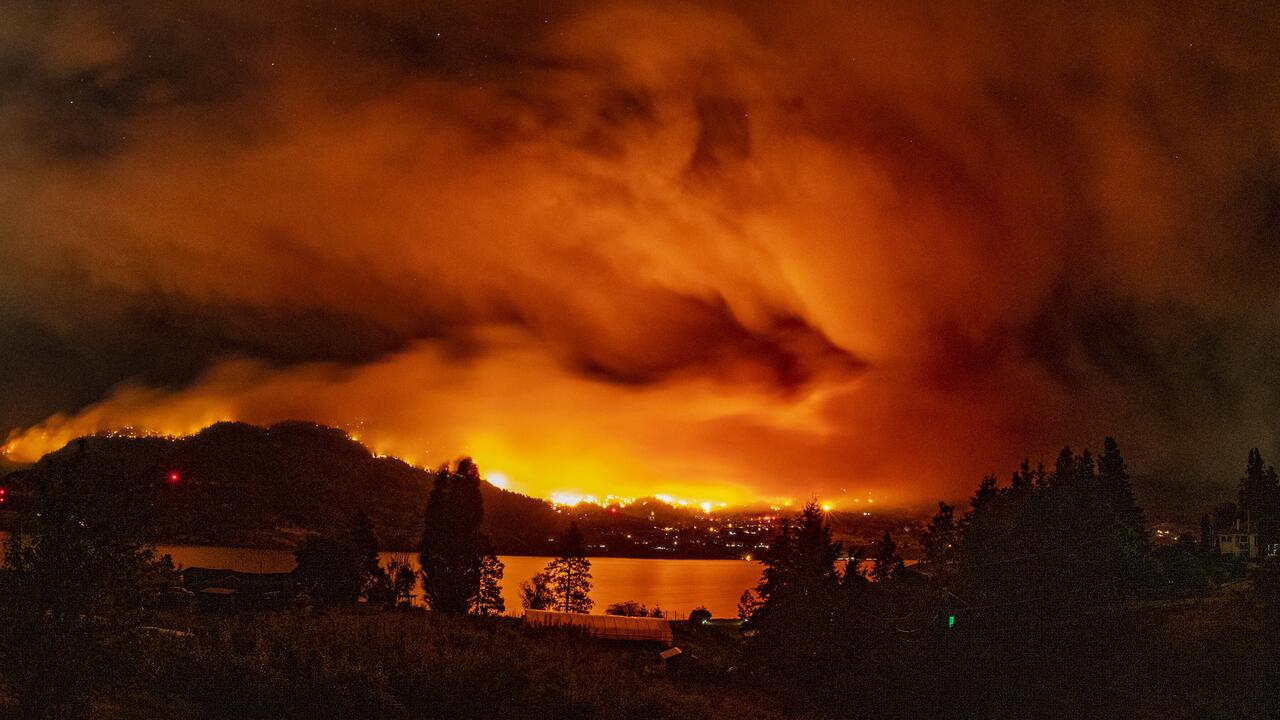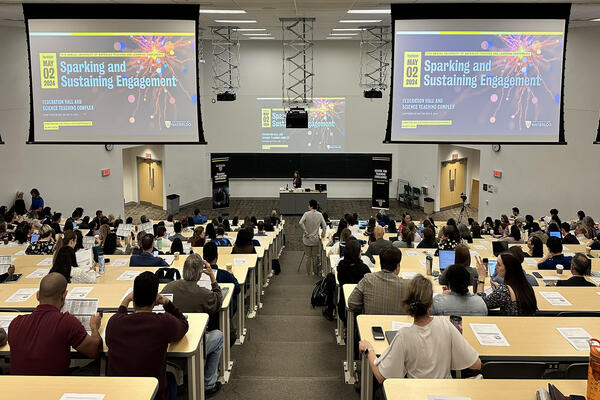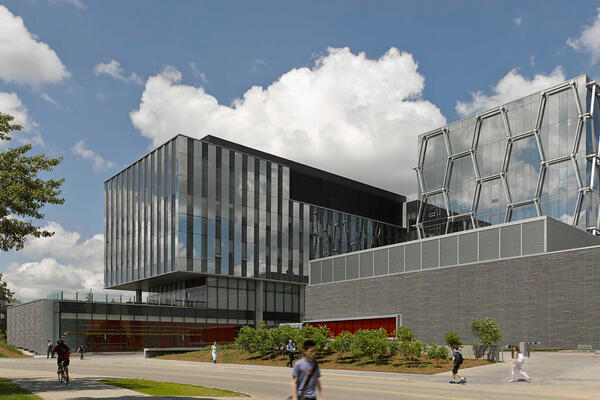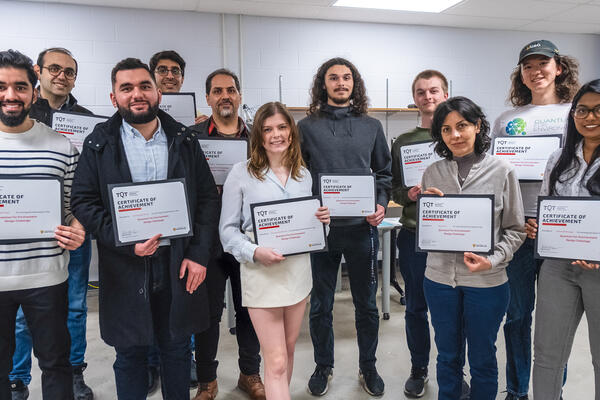
University of Waterloo experts on wildfires
Researchers are available to provide expert commentary

Researchers are available to provide expert commentary
By Media RelationsThe University of Waterloo has experts prepared to provide insights on various aspects of the 2024 wildfire season, including wildfire risk, fire spread, computer modelling of fires, the impact on industry, changes to the quality of air and water and the associated health risks.
Experts may be contacted directly via email to arrange interviews. If there is a related topic of interest not mentioned here, please reach out to Waterloo’s media relations team.
The Waterloo Artificial Intelligence Institute and WAT.ai, a student-run artificial intelligence organization, will host a wildfire hackathon for up to 150 students on campus on May 25, 2024. To arrange access, please contact media relations.
Nandita Basu
Dr. Nandita Basu is Canada Research Chair in Global Water Sustainability and Ecohydrology and a professor in the faculties of Engineering and Science. She can speak to how more frequent wildfires can increase pollution in our rivers and lakes, increase algal bloom occurrence and threaten our drinking water sources.
Monica Emelko
Dr. Monica Emelko is a professor in the Department of Civil and Environmental Engineering and Canada Research Chair in Water Science, Technology & Policy. She studies the impact of wildfires on drinking water supply and treatment, and associated health risks.
Amy Li
Dr. Amy Li is a professor in the architectural engineering program. She can comment on the ways to improve indoor air quality by keeping out particulate matter like wildfire smoke, or removing it if it gets in.
Rebecca Saari
Dr. Rebecca Saari is a systems engineer focusing on air pollution and can speak about the effects of wildfires and its relationship to human health, the economy, and climate change.
Beth Weckman
Dr. Beth Weckman is a professor in the Department of Mechanical and Mechatronics Engineering and a member of the Fire Research Group. She studies fire behaviour, risk and impact with applications to wildfires and wildfire-affected communities. Dr. Weckman worked with the National Indigenous Fire Safety Council on an app to help communities prepare for wildfires.
Mark Crowley
Dr. Mark Crowley carries out research in machine learning and how to apply it to real-world problems such as sustainable forest management, including multi-agent control of forest fires, improved prediction models of the spread of fires and how to merge multiple types of sensor data from satellite, drones and lidar.
Joshua Pulsipher
Dr. Joshua Pulsipher teaches and conducts research in the Department of Chemical Engineering. Using AI, he is currently working on tools to optimize wildfire prevention strategies, identify the safest evacuation routes for occupants of hospitals and care homes, and determine when community evacuations are required.
Linlin Xu
Dr. Linlin Xu, and his team builds AI models to predict the future wildfire risk in Canada using historical wildfire data and other related observations.
Anabela Bonada
Dr. Anabela Bonada is a research associate at the Intact Centre on Climate Adaptation at Waterloo. With expertise surrounding the intersection of climate change and wildfire, she can articulate the effects of climate change on wildfire behaviour, the consequential impacts on communities and individuals, and practical strategies for wildfire preparedness and mitigation.
Peter Crank
Dr. Peter Crank is an urban geographer and climatologist in the Department of Geography and Environmental Management. He can speak about the frequency of wildfires, their impact on urban areas, and how they affect weather patterns.
Blair Feltmate
Dr. Blair Feltmate is the head of the Intact Centre on Climate Adaptation at Waterloo. His expertise extends to the impacts of wildfire on critical infrastructure like energy systems and financial systems. He can comment on resilience strategies and risk management.
Jason Thistlethwaite
Dr. Jason Thistlethwaite is co-lead of the Climate Risk Research Group in the Faculty of Environment. He can speak about strategies that communities and homeowners can adopt to reduce wildfire risk. His current research explores how to maximize the public value of disaster risk reduction and climate change adaptation.
Gustavo Betini
Dr. Gustavo Betini is a PhD candidate in the School of Public Health Sciences who also has a doctorate in ecology. He is currently researching heat events, wildfires and climate change and their effects on the health of older persons.
Philip Bigelow
Dr. Philip Bigelow, a professor in the School of Public Health Sciences, is an occupational health researcher who studies the evaluation and measurement of health and safety management systems. He can speak to risk assessment and health effects as it concerns wildfires.
Warren Dodd
Dr. Warren Dodd is a professor in the School of Public Health Sciences. He researches how climate change interacts and shapes health and development outcomes. He can speak to the mental health impacts of wildfires and wildfire smoke, as well as community-based and health systems adaptation for wildfires and wildfire smoke.
John Hirdes
Dr. John Hirdes is a professor in the School of Public Health Sciences who studies health information measurement and management and is senior Canadian Fellow of interRAI, an international consortium of researchers. His team has researched disaster and smoke exposure specifically around older persons or persons with disabilities.
Daniel Scott
Dr. Daniel Scott is a University Research Chair in climate change and society. He can speak to the impact of wildfires and other climate change hazards on the tourism industry and provincial or national parks. He consults widely on climate change and sustainable tourism, including with UN World Tourism Organization, World Bank, OECD, and governments around the world.
Blake Phillips
Dr. Blake Phillips is the director of the School of Accounting and Finance and teaches at the interface of finance and sustainability, examining the role of business professionals in the transition to a sustainable future. Dr. Phillips was a partner in an ecosystem restoration firm and held professional biologist and forester designations in B.C.

Read more
Waterloo’s annual teaching and learning conference reenergizes faculty in their quest to stimulate student curiosity

Read more
Waterloo and Xanadu partner to continue to educate Canada’s quantum-ready workforce and pave the path for future innovators

Read more
12 Waterloo students and postdoctoral fellows receive up to $10,000 in funding to develop their green-tech solutions
The University of Waterloo acknowledges that much of our work takes place on the traditional territory of the Neutral, Anishinaabeg and Haudenosaunee peoples. Our main campus is situated on the Haldimand Tract, the land granted to the Six Nations that includes six miles on each side of the Grand River. Our active work toward reconciliation takes place across our campuses through research, learning, teaching, and community building, and is co-ordinated within the Office of Indigenous Relations.